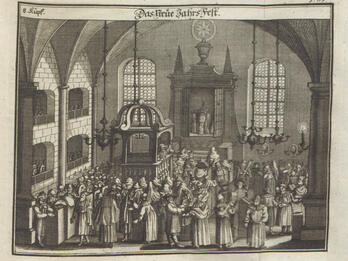Noheg ka-tson Yosef (He Leads Joseph Like a Flock): On Rosh Hashanah
21. On the second day of Rosh Hashanah, we pray as on the first day, except that the liturgical poems are different. [ . . . ]
22. And the Musaf service is as on the first day, except that we do not sing the Kaddish [to a special tune],1 nor the opening “Blessed are You” in the [Amidah] blessing about the Patriarchs. It seems to me that the reason for this is that the whole purpose of those tunes [specific to the Days of Awe], which are stamped with the stamp of truth, is to rouse up people’s hearts for judgment day, like a court crier, who calls the parties to court—and all this is relevant only in the first three hours of the day, when God sits and judges the whole world.2 Accordingly, it is granted that [we sing the special tunes during Musaf on] the first day, when the judgment is not yet over, for the first day is merely a rabbinic supplement, due to the incident that happened when the emissaries [astronomical witnesses] did not arrive until the afternoon of the thirtieth of Elul, so they observed that day as a holy day, from the afternoon onward, and they established the next day as the festival of Rosh Hashanah, and calculated the other festivals from that date, and they declared that there should be two days of Rosh Hashanah for all subsequent years,3 but from that time onward they calculate the other festivals from the first day [of Rosh Hashanah].4 So the second day of Rosh Hashanah is the biblically correct date, as stated in the book Levush ha-ḥur [by Mordechai Jaffe (ca. 1530–1612)] § 600:1.5 So the main date is the second day, and therefore the fear of the judgment is still upon us—but only in the first three hours. So, it seems to me, the writer of this book of customs, that this is why we recite more liturgical poems during Shaḥarit [morning service] of the second day than in the Shaḥarit of the first day—because the main judgment takes place at the time of Shaḥarit, the first three hours [of the day]. On the other hand, by the time of Musaf, the first three hours have already passed, for Musaf begins after the first quarter of the day; so we show that we are happy, and trust and assume that we have been vindicated in the judgment, so there is no need for the special tunes. And indeed, there are fewer liturgical poems during Musaf on the second day than in Musaf on the first day, contrary to the situation in the morning services. [ . . . ]
23. It is permitted to sleep during the second day of Rosh Hashanah, for the judgment is already over.6
Notes
[There is a German custom to recite these prayers on the second day of Rosh Hashanah in the standard Sabbath tune as opposed to the distinct, ornate Rosh Hashanah tune.—Trans.]
[According to b. Avodah Zarah 4b, God sits in judgment for three hours beginning at sunrise.—Trans.]
[See m. Rosh Hashanah 4:4.—Trans.]
[I.e., the first of the month is now calculated from the first day of Rosh Hashanah even though the second day of Rosh Hashanah is the true date of the holiday.—Trans.]
[Kosman has misinterpreted Jaffe, who writes that in the year of the incident with the witnesses, the biblically true date of Rosh Hashanah was the second day, but in subsequent years it is the first day.—Trans.]
[There is a tradition to refrain from napping during the daytime of Rosh Hashanah, and one reasons given for this practice is that it is the time of judgment, which only ends after the third hour of the second day, after which Kosman permits one to sleep.—Trans.]
Credits
Joseph Kosman, “On Rosh Hashanah,” in Noheg ka-tson Yosef (He Leads Joseph Like a Flock) (Hanau: Be-vet Yakov Basang, 1718). Republished as: Yozefa Yosef, Noheg ka-tson Yosef: Dinim minhagim u-farpera’ot (Tel Aviv: Zohar, 1969), pp. 272–273.
Published in: The Posen Library of Jewish Culture and Civilization, vol. 5.



